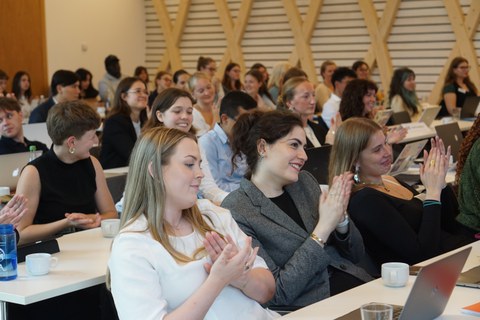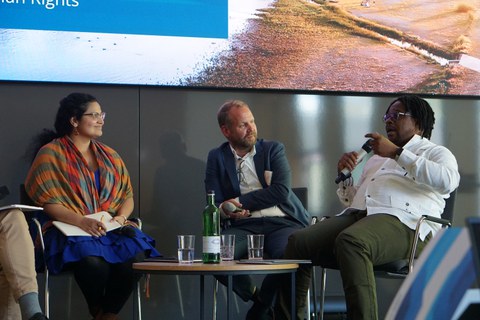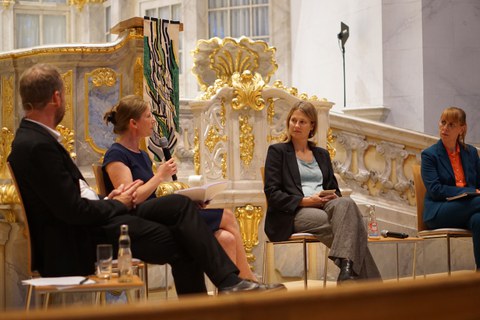Oct 06, 2025
International Summer School on Human Rights 2025: Young People from Around the World Discussed the Future of Human Rights in Dresden

At the end of August, the 4th International Summer School on Human Rights took place in Dresden in collaboration with Leipzig University.
On the occasion of the fourth International Summer School entitled “Navigating Change – Contemporary Perspectives on Human Rights” organized by the Center for International Studies (ZIS) at Technische Universität Dresden (TUD) in cooperation with Leipzig University, participants from 44 nations came together during the last week of August.
As part of a diverse and interdisciplinary program, participants gained new perspectives on global human rights challenges over five days:
Flyer of the 4th international Summer School in Dresden
Five Days, Three Topics, Many Perspectives
The participants of the Summer School explored current issues challenging the international human rights regime. When the Universal Declaration of Human Rights was adopted in 1948, climate change was not recognized as a problem, public health was primarily the responsibility of individual states, and the technology required for artificial intelligence was far in the future. These developments were unforeseen, and no specific treaties were adopted containing corresponding norms to address these human rights challenges. This becomes problematic because, in the worst case, our traditional understanding of human rights norms may no longer adequately address new realities, creating a conflict between evolving societal needs and the existing normative content.
The increasing legislative inactivity of states in this regard places a greater burden on human rights courts raising the key question of our Summer School: To what extent can human rights courts and treaty bodies respond to factual change by (re-)interpreting existing human rights norms to address new challenges?
After Monday’s introduction on the changing international human rights landscape through lectures and an Interdisciplinary Talk, each of the following days focused on a topic currently influencing human rights. In particular, the interdisciplinary panel discussion provided particpants with an in-depth preparation for the days ahead:
Tuesday’s program addressed the impacts of climate change on human rights. Increasing climate-related effects threaten, among other things, the right to life in general and the right to respect for private and family life in particular. Furthermore, climate change poses a particular threat to statehood in the Global South.
Global health gained central importance in the current human rights discussion due to the COVID-19 pandemic, which is why Wednesday’s agenda was dedicated to this topic. Numerous new challenges for international human rights protection arise in public health; from pandemics to non-communicable diseases.
Thursday focused on artificial intelligence and other technological innovations such as neurotechnology. The development and dissemination of new technologies are progressing faster than, inter alia, lawmakers can regulate them in terms of privacy and data protection, posing unprecedented challenges to the international community in safeguarding human rights.
Finally, Summer School participants tested their newly acquired knowledge in an interactive conference on Friday. In a simulation, they acted as the international community to adopt draft articles from the International Law Commission. They decided to focus particularly on protecting statehood against climate change, reducing societal diseases, and regulating AI, and adopted corresponding resolutions.
Voices from Around the World in Dialogue
Renowned experts from around the world enriched the discussions during the program, including Prof. Geir Ulfstein (University of Oslo), Prof. Dr. Kshitij Kumar Singh (University of New Delhi), Dr. Natalia Menéndez Gonzáles (European University Institute, Florence), Dr. Jan Hořeňovský (Charles University, Prague), journalist and activist Paul-Joël Kamtchang from Cameroon and Prof. Dr. Angela van der Berg (University of the Western Cape, Cape Town), offering exciting insights and new perspectives on current challenges.
The interdisciplinary approach of the Summer School was particularly evident in the Coffee Talks. Over a relaxed cup of coffee, the experts were able to engage more directly with questions and suggestions. For example, Prof. Dr. Anna Kühne, an epidemiologist at TUD, and Prof. Dr. Mette Hartlev, a professor of health law at the University of Copenhagen, debated possible limits of state responsibility for personal health together with the audience.
From Coffee Talks to the Neustadt – Exchange Beyond the Classroom
Dialogue is a crucial part of processing new ideas and insights. Summer School participants used shared lunches and evening programs to engage in lively discussions. The diversity of nations, fields of study, and professional paths ensured stimulating conversations.
On Tuesday evening, in addition to the official program, a public panel discussion was held at the Frauenkirche on the use of refugees as a weapon. In this imposing setting, voices from science and politics came together to shed light on this pressing contemporary issue:
Leisure time was also part of the program, with participants exploring the Neustadt, relaxing on grasslands of the river Elbe, and enjoying a steamboat tour on the river.
New Insights, Networks, and Approaches
The outcome of the fourth International Summer School is wholly positive. All participants leave the week with a broadened perspective on human rights and the challenges of our time. The program showed that discussion, exchange, and mutual understanding are not only possible but also necessary to keep pace with the changing world.

During the Summer School, participants gained numerous new perspectives, engaged in discussions, and established international contacts.
It became clear that given the number and speed of new developments fundamentally reshaping our world, creativity, political will and ingenuity are especially required in international law to enforce human rights effectively and adapt them in time to current circumstances. Looking beyond disciplinary boundaries and ones own perspective remains essential.
Acknowledgments
Special thanks go to the Summer School team, without whom the event would not have been possible. We also thank our reliable partners at the Frauenkirche Dresden Foundation, who ensured the smooth organization of the panel discussion. Finally, our thanks go to the Refugee Law Clinic Dresden for their support of the Summer School.
Sponsors
The 2025 International Summer School was funded by the Association of Friends and Sponsors of TU Dresden e.V., by the Federal Ministry of Education and Research (BMBF), the Free State of Saxony as part of the Excellence Strategy of the Federal and State Governments as well as the Internationale Beziehungen Dresden e.V.
Outlook
The experiences gained inspire us to continue the successful cooperation with Leipzig University, with the fifth International Summer School on Human Rights scheduled to take place in Leipzig in 2027.


